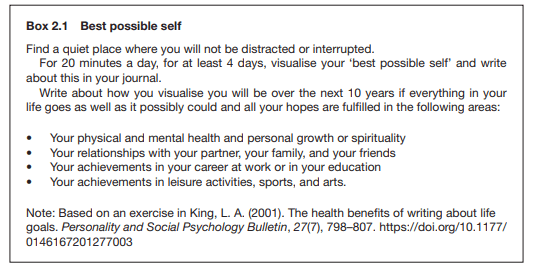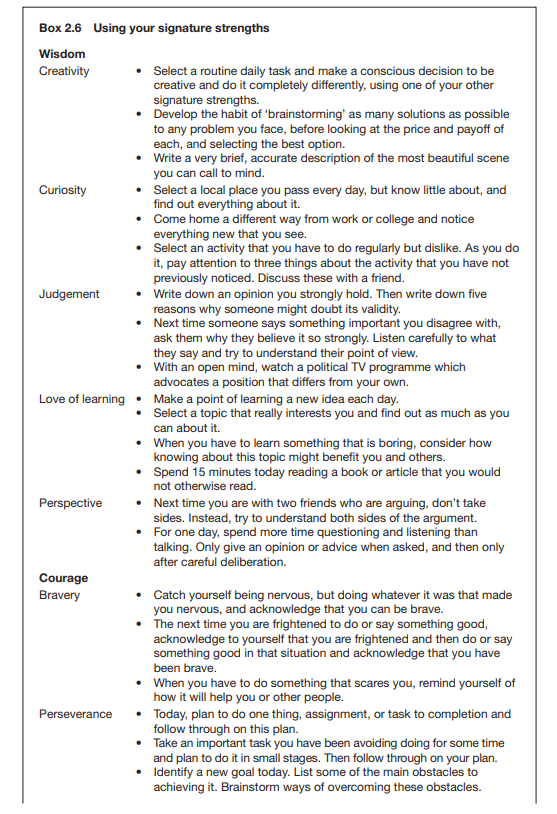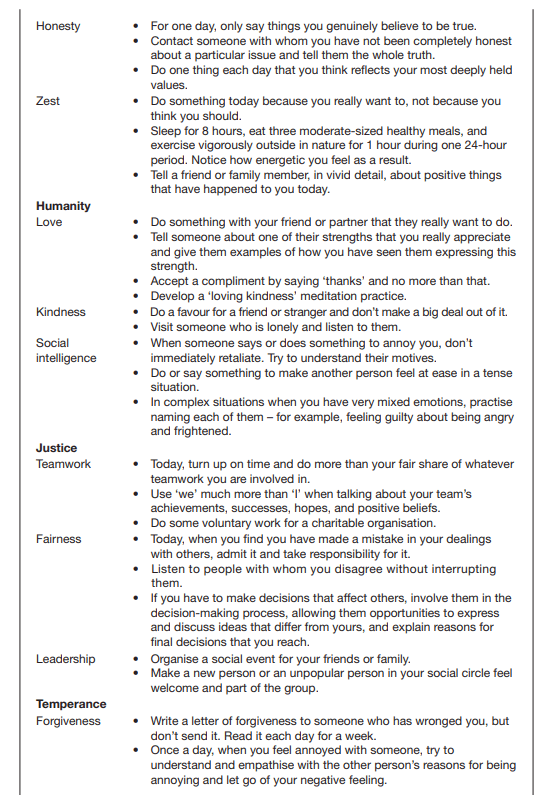Positive Belief
Positive Belief can be an agreement with statements that one’s health is good. It is the usefulness of health promotion or treatment, and the likelihood of a positive outcome from promotion or treatment efforts.
Read More- Positive Traits
The World Through Happy and Unhappy Eyes
Happiness itself regarded as a positive trait. It is because of its long-term stability and connection to genetically-influenced dispositions like positive affectivity and extraversion.
Lyubomirsky and her colleagues have taken this happiness-as-a-trait approach. Initially, they examined how chronically happy and unhappy people differ in the way they think about and interpret their lives. Given that happy and unhappy people have very different ways of looking at life. That both reflect and sustain their characteristic emotional state.
Lyubomirsky developed a 4-item Subjective Happiness Scale to provide a simple and direct basis for distinguishing between people who consider themselves to be generally happy and those who regard themselves as typically unhappy.
In a bad mood, we are more likely to be envious and jealous of what others have that we don’t. To take some comfort, perhaps even delight in the failings and misfortunes of others, and to dwell on the negative rather than the positive aspects of our lives. In contrast, happiness produces a more positive pattern. We appreciate what we have, are not so sensitive to the failings or accomplishments of others, focus on the positive aspects of life.
Self Esteem- Positive Belief
Self-esteem refers to the evaluative component of self-concept. It is the feeling of self-worth and value that results when the self judges itself. Items that people with high self-esteem would endorse include: “I feel I have a number of good qualities.” “I take a positive attitude toward myself.” “I feel I am a person of worth, at least on an equal plane with others.” Whereas, People with low self esteem would endorse items such as: “I wish I could have more respect for myself.” “I feel I do not have much to be proud of.” “I certainly feel useless at times.”

Best Possible Self Exercise
However, people with high self-esteem have a favorable view of themselves as competent, likeable, attractive, and successful people. In the extreme case (e.g., depression), low self-esteem may reflect an opposite pattern in which people see themselves as incompetent, unlikeable failures.
Self-esteem is influenced by others and bears some relationship to our actual abilities and talents. However, because self-esteem also reflects a person’s own subjective perception of self. But, it may or may not match up with the views of others.
Read More- Happiness
Self-Esteem and Happiness
Self-Esteem is consistently found to be a powerful predictor of happiness and life satisfaction. It is also related to people’s confidence and initiative in tackling new endeavors. So, whether this is striking up conversations with others, persevering at challenging tasks, speaking in front of groups, or resisting the influence of others.
People with low self-esteem are not as happy, not as confident and adventuresome, and may give up rather than try harder when faced with a difficult challenge or initial failure at a task.
High self-esteem may also have value as a buffer against stress and anxiety caused by life experiences that can threaten and deflate our self image. They may also become discouraged and dejected by failure. However, people high in self-esteem are not so easily overwhelmed by negative events. But, they are better able to endure and maintain a positive belief / outlook. As a matter of fact a positive belief is at the heart of optimistic and successful people. Likewise, Successful and confident people have positive attitudes.
Contingent Self-Esteem- Positive Belief
“A contingency of self-worth is a domain or category of outcomes on which a person has staked his or her self-esteem, so that a person’s view of his or her value or worth depends on perceived successes or failures or adherence to self-standards in that domain”
Crocker and her colleagues developed a scale to measure seven sources of self-esteem. Significantly, each source describes a different contingent basis for feelings of self-worth.
- Approval of Others
“I don’t care what other people think of me.”
“I can’t respect myself if others don’t respect me.” - Appearance
“My self-esteem does not depend on whether or not I feel attractive.”
“When I think I look attractive, I feel good about myself.” - Competition
“Doing better than others gives me a sense of self-respect.”
“Knowing that I am better than others on a task raises my self-esteem.” - Academic Competence
“My opinion about myself isn’t tied to how well I do in school.”
“Doing well in school gives me a sense of self-respect.” - Family Support
“My self-worth is not influenced by the quality of my relationships with my family members.”
“When my family members are proud of me, my sense of self-worth increases.” - Virtue
“My self-respect would suffer if I did something that was unethical.”
“I couldn’t respect myself if I didn’t live up to my moral code.” - God’s Love
“I feel worthwhile when I have God’s love.”
“My self-esteem would suffer if I didn’t have God’s love.”
However, People who take pride in their appearance were found to spend more hours grooming, shopping, and partying. Those whose self-esteem based on God’s love, party less, but pray and go to church more. Whereas, Academic competence as a basis of self-esteem linked to success in getting into graduate school.
Virtue and Strengths of Character
Virtue is a quality or characteristic that has positive connotations in a particular society and that is considered beneficial to psychological health.
Virtuous behavior may also increase our life satisfaction and make life more meaningful and healthy. However, virtue also considered a positive trait independent of any benefit or “pay-off” to the individual. Virtue is positively regarded in its own right because of its connection to religious and secular mores and its value to society. A consideration of virtue and character strengths provides an additional way to think about the meaning of “positive.”
Developing a Classification of Human Virtues
The interest in character strengths has begun to emerge as more psychologists have come to realize that a complete account of human behavior needs to include the moral dimension of people’s lives. However, people lead moral lives in the sense of evaluating themselves and others according to moral criteria.
The meaning of a good person and a good life are intimately connected to virtue. Whereas, positive psychology has given virtue particular prominence. But Developing a classification of character strengths is a daunting task. Virtue and character are obviously complex topics. What, exactly, is a human virtue or character strength?
The VIA (Value in Action Project), coordinated by Christopher Peterson and Martin Seligman, brought together a group of researchers who sought to describe those strengths of character that were comparatively most prominent across history and culture.
From a long list of candidates, 24 character strengths were selected and organized around 6 virtues. They selected 6 virtues-wisdom, courage, humanity, justice, temperance, and transcendence because they appear to be universal across history and across societies. Moreover, Peterson and Seligman regard these virtues as core defining features of good character.
In addition, each virtue defined by a set of character strengths that represent the ingredients, expressions, and potential means of developing the virtue. For example, temperance as a virtue refers to people’s strength in avoiding excesses. Correspondingly, the ingredients and expressions of temperance would include self-control, gratitude toward others, humility, prudent decision-making, and the ability to forgive the transgressions of self and others. However, developing this virtue would involve efforts to exert more self-control, become more humble and less self-aggrandizing, and more grateful and for giving in relationships with others.
Classification of Virtues and Character Strengths
1. Wisdom and Knowledge
Cognitive strengths that entail the acquisition and use of knowledge.
Defining Strengths
1. Creativity—thinking of novel and productive ways to do things.
2. Curiosity—taking an interest in all ongoing experience.
3. Open-mindedness—thinking things through and from all sides.
4. Love of learning—mastering new skills, topics, as well as bodies of knowledge.
5. Perspective—being able to provide wise counsel to others.
2. Courage
Emotional strengths that involve exercise of will in the face of opposition, external or internal.
Defining Strengths
6. Authenticity—speaking the truth and correspondingly presenting yourself in a genuine way.
7. Bravery—not shrinking from threat, challenge, difficulty, or pain.
8. Persistence—finishing what one starts despite obstacles along the way.
9. Zest—approaching life with excitement and energy.
3. Humanity
Interpersonal strengths that involve “tending and befriending” others.
Defining Strengths
10. Kindness—doing favors and also good deeds for others.
11. Love—valuing close relations with others.
12. Social intelligence—being aware of the motives coupled with feelings of self and others.
4. Justice
Civic strengths that underlie healthy community life.
Defining Strengths
13. Fairness—treating all people the same according to notions of fairness together with justice.
14. Leadership—organizing group activities and seeing that they happen.
15. Teamwork—working well as member of a group or team.
5. Temperance
Strengths that protect against excess.
Defining Strengths
16. Forgiveness—forgiving those who have done wrong.
17. Modesty—letting one’s accomplishments speak for themselves.
18. Prudence—being careful about one’s choices; not saying or doing things that might be later regretted.
19. Self-regulation—regulating what one feels and does.
6. Transcendence
Strengths that forge connections to the larger universe and providing meaning.
Defining Strengths
20. Appreciation of beauty and excellence—noticing as well as appreciating beauty, excellence, and/or skilled performance
in all domains of life.
21. Gratitude—being aware of and equally thankful for good things that happen.
22. Hope—expecting the best and simultaneously working to achieve it.
23. Humor—liking to laugh as well as tease; bringing smiles to other people.
24. Religiousness/Spirituality—having coherent beliefs about the higher purposes and likewise a meaning of life.

Using Our Characteristic Strenghts

Using Our Characteristic Strenghts

Using Our Characteristic Strenghts
Reference
Positive Psychology. Baumgardner and Crothers. 2015. Pearson India Education.
Positive Psychology: The Science of Happiness and Flourishing.
Carr, A. (2004). Positive psychology: The science of happiness and human strengths. Routledge.
Dr. Balaji Niwlikar. (2022, May 26). Explore Positive Belief and 6 Virtues and Strengths of Character. Careershodh. https://www.careershodh.com/positive-belief/
